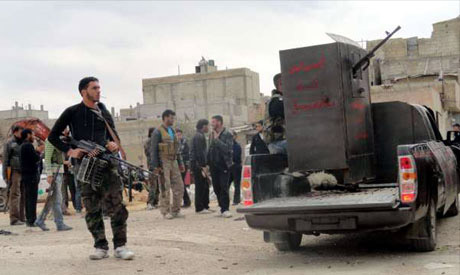The April 12 ceasefire in Syria is "incomplete" and human rights violations are still "perpetrated with impunity," the United Nations said Monday as more casualties were reported.
The top UN political affairs officer, B Lynn Pascoe, told the UN Security Council that achieving a "full and sustained" end of hostilities, and seeking a peaceful resolution in Syria, remain at the centre of UN efforts in the Middle East, dpa reported.
Pascoe said Syrian authorities have to date failed to release people arbitrarily detained during the conflict and respect Syrians' right to peacefully demonstrate - two conditions set for advancing a political solution in Syria.
A UN team has been in Syria since the ceasefire went into effect. The Security Council approved a resolution on Saturday expanding the observer mission from 30 to 300, initially for 90 days.
The ceasefire has so far failed to halt the violence, which the UN says has killed more than 9,000 people since March 2011.
Pascoe's statements come as violence kills at least 28 people Monday, mainly in the restive province of Hama.
"The shells rained down on the neighbourhood of al-Arbaeen killing at least 20 people," activist Firas al-Hamawi said.
Another activist in the nearby province Homs told dpa that, despite the presence of two UN observers in the city, troops were strengthening their positions.
By contrast, the state-run news agency SANA said "terrorists" had killed a doctor in the southern part of the city, two military officers in the central province of Hama and two others in the southern province of Daraa.
The government has been blaming the uprising, which erupted in March 2011, on terrorists financed by Arab and western countries.
According to a peace plan brokered by international envoy Kofi Annan, the April 12 truce should be followed by a withdrawal of heavy weapons and tanks from populated regions, the release of detainees, and the granting of humanitarian access to the most violent areas.
Earlier Monday, troops and rebels clashed near Damascus, with the sound of heavy explosions causing panic among residents.
"The sound of at least 10 loud explosions were heard across the capital, so far we do not have casualties, but the clashes concentrated in the Damascus suburbs areas," activist Hayatham al-Abdulah told dpa.
Shortly afterwards, an advance UN team visited the restive area of Zabadani, Douma and Harsta, Neeraj Singh, the observers' spokesman, told dpa.
Chanting crowds of anti-regime protesters greeted the UN team as they entered Zabadani.
More observers are expected to arrive later on Monday, while "more will join the mission in the coming few days," Singh said.
In response to the latest wave of violence, European Union foreign ministers approved in Luxembourg new restrictive measures against the Syrian regime.
The new round of sanctions, the 14th against Damascus this year, target the import of luxury goods and so-called dual-use equipment that could also be deployed for "internal repression."
EU foreign affairs chief Catherine Ashton said the bloc had approved the new set of sanctions "because of deep concern about the situation and continuing violence in spite of the cease-fire."
The new sanctions target the country's business community, who strongly support the Syrian government of Bashar al-Assad.






